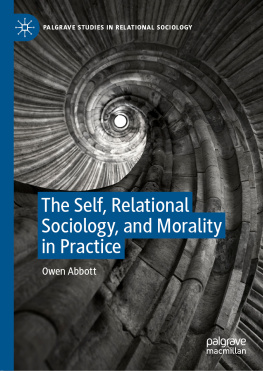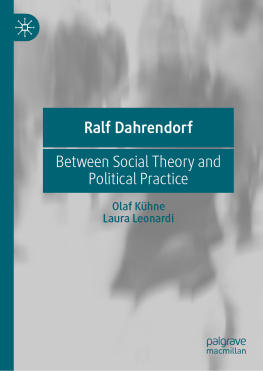First published 2002 by Pearson Education Limited
Published 2013 by Routledge
2 Park Square, Milton Park, Abingdon, Oxon OX14 4RN
711 Third Avenue, New York, NY 10017, USA
Routledge is an imprint of the Taylor & Francis Group, an informa business
Copyright 2002, Taylor & Francis.
All rights reserved. No part of this book may be reprinted or reproduced or utilised in any form or by any electronic, mechanical, or other means, now known or hereafter invented, including photocopying and recording, or in any information storage or retrieval system, without permission in writing from the publishers.
Notices
Knowledge and best practice in this field are constantly changing. As new research and experience broaden our understanding, changes in research methods, professional practices, or medical treatment may become necessary.
Practitioners and researchers must always rely on their own experience and knowledge in evaluating and using any information, methods, compounds, or experiments described herein. In using such information or methods they should be mindful of their own safety and the safety of others, including parties for whom they have a professional responsibility.
To the fullest extent of the law, neither the Publisher nor the authors, contributors, or editors, assume any liability for any injury and/or damage to persons or property as a matter of products liability, negligence or otherwise, or from any use or operation of any methods, products, instructions, or ideas contained in the material herein.
ISBN: 978-0-13-026553-1 (pbk)
British Library Cataloguing-in-Publication Data
A catalogue record for this book can be obtained from the British Library
Library of Congress Cataloging-in-Publication Data
Theory and practice in sociology / edited by Ian Marsh.
p. cm.
Includes bibliographical references and index.
ISBN 0-13-026553-5 (alk. paper)
1. SociologyPhilosophy. 2. SociologyMethodology. I. Marsh, Ian, 1952- HM585 .T4785 2002
301.01dc21 2002071553
Theory and Practice in Sociology aims to provide students (and tutors) with a comprehensive, clear and accessible introduction to the different methods and practice of social research and the main theoretical approaches in sociology. By covering both research methods and theory, students and tutors have a text that examines the two areas that are generally compulsory, core elements of sociology undergraduate degrees. Sociological methods and theories in some guise (such as sociological analysis; methods of research in sociology; sociological knowledge and practice) -are invariably compulsory parts of level 2 (usually year 2) programmes in sociology. And, if not compulsory, there are modules or courses on methods and theories in all such degree programmes.
Theory and Practice in Sociology reviews and examines ideas, issues and arguments in greater depth than is possible through the summaries provided in specific chapters in large, all-encompassing sociology textbooks. It provides more detailed and fuller examples and case studies of specific methodological and theoretical approaches; and an opportunity for students to reflect on these. While each of the two main areas methods and theories could be covered in separate texts, and while the two areas are distinct and we would not look for artificial links between them for the sake of it, covering both in one book enables regular cross-referencing between practice and theory with particular studies referred to in one section re-examined from a range of theoretical and methodological viewpoints in different parts of the book. It also enables students to get a fuller flavour of original arguments than they can from general introductory texts. At the same time, they are not faced with a massively detailed tome.
Structure and features
A key characteristic of Theory and Practice in Sociology is its interactive approach which encourages students to react to the material covered and to think for themselves. The active engagement of students with the material helps to distinguish this from other texts in the area and provides a real teaching resource for tutors. We have not included questions for the sake of it, but there are a number of Discussion Questions in each chapter which provide reflective breaks and will encourage students to consider perhaps a case study or the discussion and respond to questions on it. In particular, these questions will try to stimulate them to relate general issues to their own situations and lives.
In addition to these mini-activities, at the end of each chapter are fuller Exercises, which could be used as groupwork exercises or undertaken by students as individual pieces of work. These exercises usually involve students reflecting on the material in the chapter and possibly undertaking some additional research and reading of their own.
As regards the contents, there are two main parts to the book: Sociological Practice and Sociological Theory. In focuses on the practical issues involved in doing social research and describes the major stages of the research process. The issues examined include: the choice of research topic and the formulation of research questions and hypotheses; the strengths and weaknesses of the different research techniques and methods available; the interpretation and analysis of research data; and the publicising of research findings.
. In particular it describes the intellectual origins of social theory in the Enlightenment and then examines the work of five key nineteenth-century social theorists: Comte, Spencer, Durkheim, Marx and Weber. It is argued that studying these classic social theorists cannot be divorced from studying the Enlightenment, as the work of these great thinkers was a debate with the issues raised by that movement. Among the major developments of the Enlightenment that prompted the emergence of social theory were an emphasis on intellectual rigour, a conception of society as composed of individuals, an attempt to rationally understand their behaviour, a concern with social interconnection, a rational approach to the state and a stress on classification and typology.
traces the emergence of modern society and modern social theory in the early twentieth century. It considers the relationship of the Enlightenment and classic social theorists to these developments and, in particular, to the work of four modern theorists: Simmel, Tnnies, Nietszche and Freud. Each of these writers (it is not really appropriate to describe Freud and Nietzsche, at least, as sociologists) tried to explain the nature of modern urban/industrial society and, to varying degrees, compared this form of society unfavourably with pre-modern social structures.











